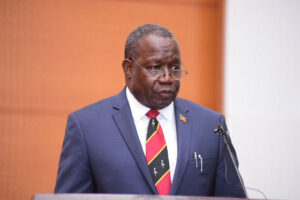Is Uganda’s Parliamentary Politics Centred on Personalities Rather than Policies?
While accountability is crucial, these debates have often overshadowed more urgent policy issues such as economic reforms, healthcare, and education.

Op-Ed: The role of Parliament in any democracy is to represent the will of the people, draft and pass laws, scrutinise government policies, and hold the executive accountable.
In Uganda, Parliament is expected to drive national development through well-considered legislation and informed debate. However, it appears that Uganda’s parliamentary politics is increasingly focused on personalities rather than policies.
Over the past year, much of Uganda’s parliamentary debate has revolved around individuals rather than substantive policies that could improve the lives of ordinary citizens. For instance, considerable time has been spent discussing the censure of ministers implicated in corruption scandals.
While accountability is crucial, these debates have often overshadowed more urgent policy issues such as economic reforms, healthcare, and education.
In contrast, other countries like Kenya and Rwanda have managed to keep their parliamentary debates more focused on policy, even when dealing with matters of individual responsibility.
In Kenya, for example, the debate over the Finance Bill was heated, but it remained focused on the economic implications for citizens rather than on the personalities supporting or opposing the bill. Similarly, Rwanda’s Parliament is recognised for its emphasis on developmental policies, with discussions rarely descending into personal attacks.
When politics becomes centred on personalities rather than policies, several dangers arise. First, it distracts from the real issues. Instead of debating how to improve vital services or tackle national challenges, MPs spend valuable time arguing about the behaviour or character of their colleagues. This not only wastes time but also prevents meaningful progress on pressing issues.
Furthermore, personality-driven politics encourages a culture of hero worship and vilification, where the focus shifts to defending or attacking individuals rather than analysing their actions and ideas.
This can deepen divisions within society, as people align themselves with specific personalities instead of considering the principles or policies that could benefit the nation.
The cost of this shift in focus is substantial. Time that could be used to develop and implement policies addressing Uganda’s challenges is instead squandered on personal conflicts.
This has a detrimental effect on the country’s development, delaying or stalling policies that could improve the economy, create jobs, and enhance public services. Consequently, the economy stagnates, public services remain underfunded, and the population grows increasingly disillusioned.
Moreover, when Parliament neglects to focus on policies, it sends a signal to the rest of the country that personalities matter more than principles.
This is evident in mainstream and social media commentaries and everyday conversations, where the focus is often on defending or condemning individuals involved in scandals rather than discussing the broader issues at stake.
The obsession with personalities over policies means that the public is less informed about the issues that truly matter, leading to divisive and unproductive discourse.
Uganda cannot afford to continue down this path. Parliament, and indeed the public, must shift their attention back to policies. This requires prioritising debates on issues that impact the daily lives of Ugandans, such as healthcare, education, and economic development. It also involves holding individuals accountable not just for their personal conduct but for their contributions to national progress through sound policies.
While personalities will always play a role in politics, they should not eclipse the policies that shape the nation’s future. Uganda’s Parliament must rise above the distractions of personality-driven politics and refocus on the issues that truly matter. Only by doing so can Uganda achieve its potential and move forward as a nation.
The author is Gertrude Kamya Othieno, Critical Political Sociologist (LSE Alumna)
Disclaimer: As UG Reports Media LTD, we welcome any opinion from anyone if it’s constructive for the development of Uganda. All the expressions and opinions in this write-up are not those of UG Reports Media Ltd. but of the author of the article.
Would you like to share your opinion with us? Please send it to this email: theugreports@gmail.com.






